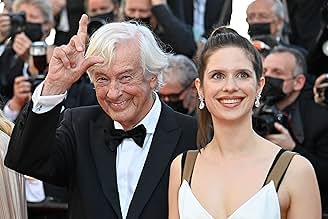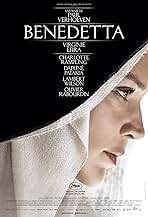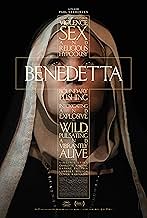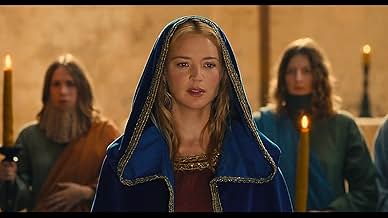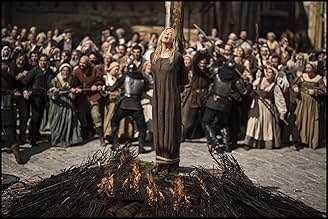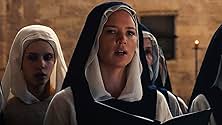Una monja del siglo XVII en Italia sufre perturbadoras visiones religiosas y eróticas. Ella es asistida por una compañera y la relación entre las dos mujeres se convierte en una historia de ... Leer todoUna monja del siglo XVII en Italia sufre perturbadoras visiones religiosas y eróticas. Ella es asistida por una compañera y la relación entre las dos mujeres se convierte en una historia de amor romántica.Una monja del siglo XVII en Italia sufre perturbadoras visiones religiosas y eróticas. Ella es asistida por una compañera y la relación entre las dos mujeres se convierte en una historia de amor romántica.
- Dirección
- Guionistas
- Elenco
- Premios
- 3 premios ganados y 21 nominaciones en total
Opiniones destacadas
Some film critics in Greece thought that this movie is a hybrid of parody and satire in its attitude towards organized religion. I disagree. Although the treatment of religious themes is rather blasphemous by pietistic standards the amount of human misery and suffering portrayed does not allow the viewer to conceive the movie as satire at least solely as such. Surely the religious visions and the sexual adventures of Benedetta treat religion irreverently but the consequences for her and her protégé Bartolomea have nothing humorous about them. In that time, unlike ours - at least in the West- no jokes were allowed concerning religion.
Misery, violence, intrigue abound in the plot and lust, although explicit, is just one of the sins portrayed. Ambition, struggle for power and precedence, avarice are the prevailing motives of the characters. Christian charity pales before those demonic passions although it is not totally absent.
The plight of the poor, the intrigues of the powerful, the omnipresence of the plague, the violence of the soldiery offer a bleak picture of society. One is reminded of Flesh and Blood by the same director situated in about the same historical period. Both have a central heroine with superb survival skills to help her navigate through insurmountable adversities.
Humour and satire exist but the general atmosphere is so ominous, so laden with menace, violence and disease that you are left saddened with the misery inherent in the human experience of 17nth century Tuscany. Nothing betrays the artistic splendour of the Renaissance, just a bleak struggle for survival and mastery, for power and precedence, for wealth and prestige where Christianity is used to serve those ulterior motives.
It is a sad movie. That said Virginie Efira and Daphne Patakia are gorgeous both artistically and sexually. But I think Charlotte Rampling in the role of the abbess gives the more memorable performance as a character full of ambiguity and contradictions. Lambert Wilson shines as the satanic nuncio although his character is rather flat in his evil propensities.
The costumes and the representation of the era are superb and the religious visions of Benedetta are far-fetched and subversive. Pietistic believers are going to be offended and will probably say: would he dare to do the same with Muslim religious symbols? But I do not think that the movie is anti-Christian. It shows how lofty ideals are used by flawed humans to further very earthly ambitions.
It is true though that without divine solace the society portrayed by Benedetta would be impossible to live in. Watch the movie and form your own opinion.
Misery, violence, intrigue abound in the plot and lust, although explicit, is just one of the sins portrayed. Ambition, struggle for power and precedence, avarice are the prevailing motives of the characters. Christian charity pales before those demonic passions although it is not totally absent.
The plight of the poor, the intrigues of the powerful, the omnipresence of the plague, the violence of the soldiery offer a bleak picture of society. One is reminded of Flesh and Blood by the same director situated in about the same historical period. Both have a central heroine with superb survival skills to help her navigate through insurmountable adversities.
Humour and satire exist but the general atmosphere is so ominous, so laden with menace, violence and disease that you are left saddened with the misery inherent in the human experience of 17nth century Tuscany. Nothing betrays the artistic splendour of the Renaissance, just a bleak struggle for survival and mastery, for power and precedence, for wealth and prestige where Christianity is used to serve those ulterior motives.
It is a sad movie. That said Virginie Efira and Daphne Patakia are gorgeous both artistically and sexually. But I think Charlotte Rampling in the role of the abbess gives the more memorable performance as a character full of ambiguity and contradictions. Lambert Wilson shines as the satanic nuncio although his character is rather flat in his evil propensities.
The costumes and the representation of the era are superb and the religious visions of Benedetta are far-fetched and subversive. Pietistic believers are going to be offended and will probably say: would he dare to do the same with Muslim religious symbols? But I do not think that the movie is anti-Christian. It shows how lofty ideals are used by flawed humans to further very earthly ambitions.
It is true though that without divine solace the society portrayed by Benedetta would be impossible to live in. Watch the movie and form your own opinion.
At the age of 83, it is wonderful to see Paul Verhoeven mojo's still on fire after all these years. His latest offering Benedetta (2021), a provocative lesbian affair in a 17th-century nunnery set amidst the bubonic plague is more than erotic drama as Verhoeven manages to mix dogmas of faith & superstition in the narrative. It definitely lives up to its billing as one of his best film, exceptionally well made all around and stays true to form throughout. Along the way, it has a true and sad story to tell, but it is an entertaining film with funny characters and Jesus Christ cameo with a sword-slinging fight sequence. The film might feel inconsistent in its satire on the Catholic Church but it definitely hits hard where it counts. The best is in the 2nd half, there is an intriguing balance between the satire and the obscene, waddling constantly between the two, with wild moments.
The film has few shortcomings, but they are completely outweighed by its main advantage - cinematography, soundtrack and the wacky screenplay. On the acting side we have a stable interpretive work of all those involved, but the one who stands out the most is Virginie Efirahas, some of the best acting of the year.
Overall, 'Benedetta' is an Paul Verhoeven movie at its best. It is a mischievous film in the very spirit of Ken Russell's The Devils (1971) and Nunsploitation classics. It might feel off-putting before becoming entertaining and it succeeds in doing this in all aspects.
The film has few shortcomings, but they are completely outweighed by its main advantage - cinematography, soundtrack and the wacky screenplay. On the acting side we have a stable interpretive work of all those involved, but the one who stands out the most is Virginie Efirahas, some of the best acting of the year.
Overall, 'Benedetta' is an Paul Verhoeven movie at its best. It is a mischievous film in the very spirit of Ken Russell's The Devils (1971) and Nunsploitation classics. It might feel off-putting before becoming entertaining and it succeeds in doing this in all aspects.
This movie was banned from film distribution in Russia so I started watching in hopes of explicit scenes and 'forbidden fruits', but continued thanks to the acting work of Charlotte Rampling. What a marvelous actress.
Benedetta is a take on a real life story about a young woman in the middle ages who believes so wholeheartedly in Jezus and the love of God, that around her, mysterious stuff happens. What follows is a film that does not shy away from both controversy and visceral body action, while all the time, keeping the mystery alive, and occasionally even poking great fun at the subject.
Benedetta is put in the House of God with nuns and priests who do not really seem to believe in the divine themselves, setting up for conflict in religion and faith. This being a Verhoeven film, we get to see everything, including sex between nuns, which is not really a spoiler, since it made the film instantly infamous.
For a Verhoeven film, the sex and violence is actually mild, which isn't to say it's not prominent. But it's the underlying story that makes it truly interesting: how does a woman with such devotion, love and sex appeal, fair in the horridly abusive culture of the Church in the middle ages? Does she overcome it? And is she truly blessed by God or not?
I'll leave that for you to discover yourself. I will say without giving anything away, that the acting and directing is done with ferocious passion and conviction, that the film covers all emotions and feels accurate in its depiction of this historic woman her life.
Again, Verhoeven delivers.
Benedetta is put in the House of God with nuns and priests who do not really seem to believe in the divine themselves, setting up for conflict in religion and faith. This being a Verhoeven film, we get to see everything, including sex between nuns, which is not really a spoiler, since it made the film instantly infamous.
For a Verhoeven film, the sex and violence is actually mild, which isn't to say it's not prominent. But it's the underlying story that makes it truly interesting: how does a woman with such devotion, love and sex appeal, fair in the horridly abusive culture of the Church in the middle ages? Does she overcome it? And is she truly blessed by God or not?
I'll leave that for you to discover yourself. I will say without giving anything away, that the acting and directing is done with ferocious passion and conviction, that the film covers all emotions and feels accurate in its depiction of this historic woman her life.
Again, Verhoeven delivers.
Sex and violence are par for the course for a Paul Verhoeven film, but, one rarely expects it in such copious amounts in a film based on a true story account of a 17th century Catholic nun, Benedetta Carlini. The key word is 'based' for Verhoeven and co-writer David Birke have freely adapted Judith Brown's non-fiction book.
Set in Tuscany, Benedetta is a tale of a young Italian woman (the movie is in French) who claimed to have had vivid visions of Jesus from an early age. Once in a Convent in Pescia, Benedetta (played as an adult by a stout Virginie Efira) rises to the rank of Abbess much to the dismay of the former Mother Superior, Felicita (an excellent Charlotte Rampling). Her manifestations continue and become more graphic even reaching the point of stigmata and speaking in tongues. A rumored affair with a fellow nun, Bartolomea (a mischievous Daphné Patakia) brings suspicion, scorn and charges of heresy in the form of Alfonso (Lambert Wilson; relishing his evil side) who comes from Florence to prosecute the case. The plague is raging and Verhoeven's film boils into a bloodier, sexier take on Ken Russell's THE DEVILS. Something of a MARK OF THE DEVIL for the Cannes crowd.
And yet, Verhoeven has created a work of subversive, yet profound, religiousness. Benedetta's devotion to the lord is never in doubt Her fervor, inspired and deeply felt even when not in keeping with the letter of scripture. Only a filmmaker as fervid as his subject could create at once something so sacrilegious while also remaining true to the essence of the character. There is no question that Verhoeven can never be accused of having good taste (and there are times here where if he pulled back even a little, it would have only improved the work), but, sometimes that seeming contradiction is what can create such stirring art. BENEDETTA is a direct challenge to believers and non-believers alike.
Set in Tuscany, Benedetta is a tale of a young Italian woman (the movie is in French) who claimed to have had vivid visions of Jesus from an early age. Once in a Convent in Pescia, Benedetta (played as an adult by a stout Virginie Efira) rises to the rank of Abbess much to the dismay of the former Mother Superior, Felicita (an excellent Charlotte Rampling). Her manifestations continue and become more graphic even reaching the point of stigmata and speaking in tongues. A rumored affair with a fellow nun, Bartolomea (a mischievous Daphné Patakia) brings suspicion, scorn and charges of heresy in the form of Alfonso (Lambert Wilson; relishing his evil side) who comes from Florence to prosecute the case. The plague is raging and Verhoeven's film boils into a bloodier, sexier take on Ken Russell's THE DEVILS. Something of a MARK OF THE DEVIL for the Cannes crowd.
And yet, Verhoeven has created a work of subversive, yet profound, religiousness. Benedetta's devotion to the lord is never in doubt Her fervor, inspired and deeply felt even when not in keeping with the letter of scripture. Only a filmmaker as fervid as his subject could create at once something so sacrilegious while also remaining true to the essence of the character. There is no question that Verhoeven can never be accused of having good taste (and there are times here where if he pulled back even a little, it would have only improved the work), but, sometimes that seeming contradiction is what can create such stirring art. BENEDETTA is a direct challenge to believers and non-believers alike.
¿Sabías que…?
- TriviaProduction ended November 2018, and the film was initially scheduled for release at the Cannes Film Festival in 2019, but in December 2018, director Paul Verhoeven had to undergo surgery for a hip injury suffered due to the set's location, which involved lots of hills and climbing. Post-production in Amsterdam had to be delayed until June 2019 to allow time for him to recover from his surgery. However, subsequent complications from pain medication caused an intestinal obstruction that ended in a life-threatening colon perforation; fortunately, Verhoeven's wife urged him to go to the hospital in time. Verhoeven and producer Saïd Ben Saïd agreed to delay the release to 2020 in order for Verhoeven to recover, and be fully present during the post-production process. Verhoeven still credits his editor Job ter Burg for finishing much of the film on his own while he himself was recovering and unable to attend. Eventually, the world-wide COVID-19 pandemic caused the movie to be delayed for another year.
- ErroresAfter the nuncio has demonstrated the pear of anguish, it is nearly closed again, but when he hands it to the torturer it is suddenly opened.
- Citas
Benedetta: Pride is a sin.
Soeur Jacopa: We're all entitled to a sin. What's yours?
- ConexionesFeatured in Javo & Temoc: Top 10 Películas: Lo "mejor" del año (2022)
Selecciones populares
Inicia sesión para calificar y agrega a la lista de videos para obtener recomendaciones personalizadas
- How long is Benedetta?Con tecnología de Alexa
Detalles
- Fecha de lanzamiento
- Países de origen
- Sitios oficiales
- Idiomas
- También se conoce como
- Blessed Virgin
- Locaciones de filmación
- abbaye cistercienne, Le Thoronet, Var, Francia(convent interiors)
- Productoras
- Ver más créditos de la compañía en IMDbPro
Taquilla
- Presupuesto
- USD 24,350,000 (estimado)
- Total en EE. UU. y Canadá
- USD 354,481
- Fin de semana de estreno en EE. UU. y Canadá
- USD 136,839
- 5 dic 2021
- Total a nivel mundial
- USD 4,265,353
- Tiempo de ejecución2 horas 11 minutos
- Color
- Mezcla de sonido
- Relación de aspecto
- 2.39 : 1
Contribuir a esta página
Sugiere una edición o agrega el contenido que falta

Principales brechas de datos
What is the streaming release date of Benedetta (2021) in India?
Responda






